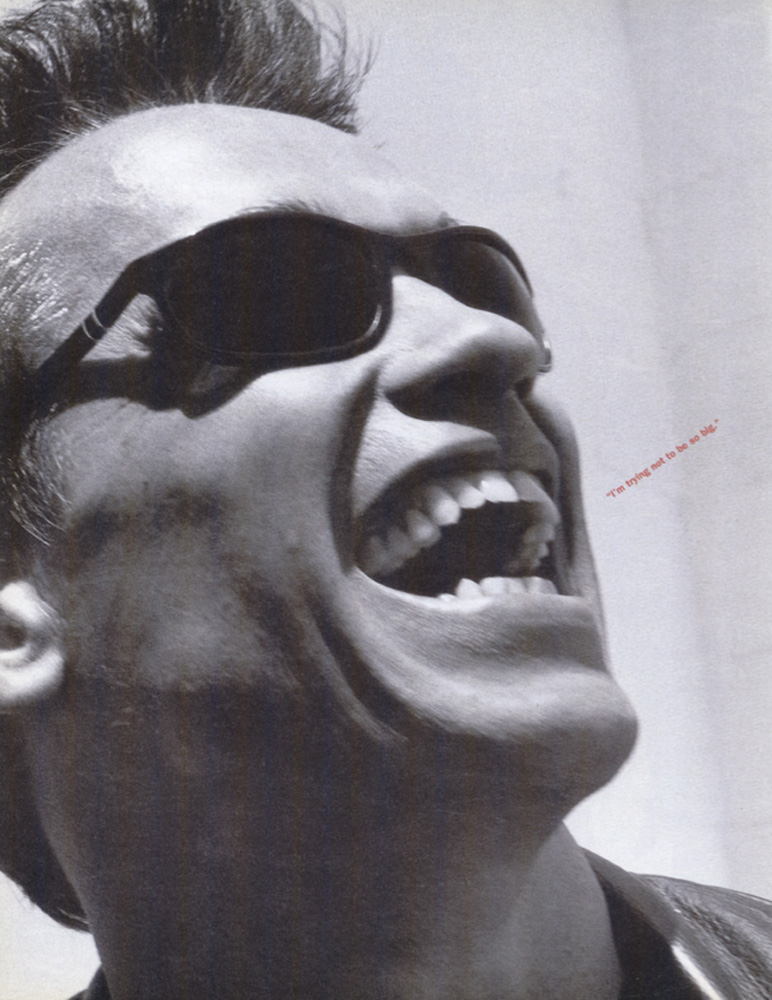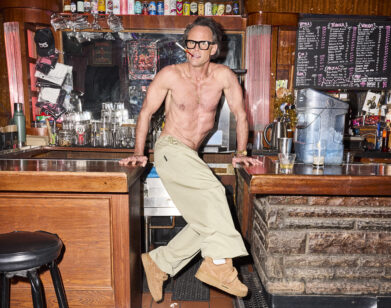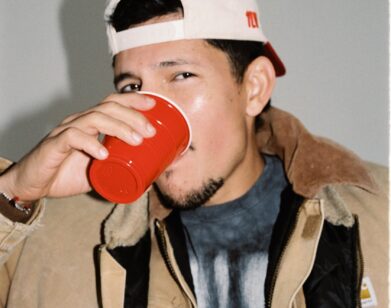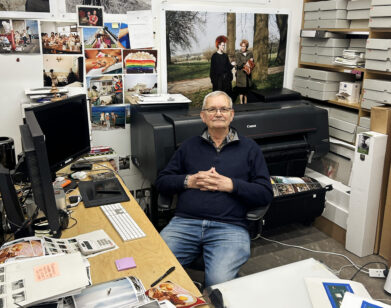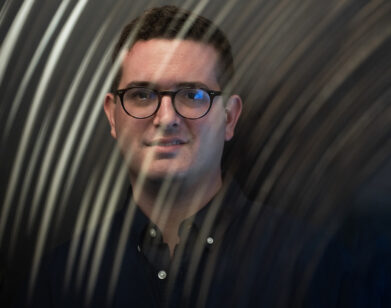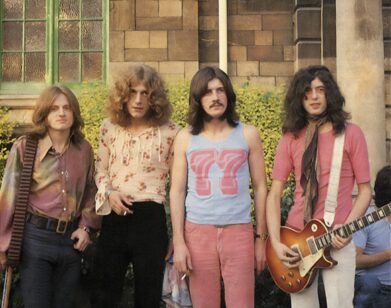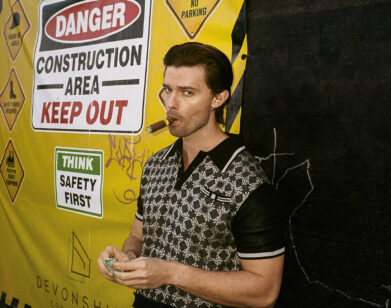New Again: Arnold Schwarzenegger
In New Again, we highlight a piece from Interview’s past that resonates with the present.
In 1991, when he sat down with us for an interview just before the release of Terminator 2, it seemed that Arnold Schwarzenegger had already lived more than a full life. The Austrian actor had seen himself crowned Mr. Universe by age 20 and was already Hollywood’s biggest star after turns in The Terminator (1984), Predator (1987), and Twins (1988). That was 22 years ago. Since then, Schwarzenegger has gotten pregnant (Junior, 1994), fought Batman (Batman & Robin, 1997—featuring Schwarzenegger as a pun-spewing Mr. Freeze), served two terms as Governor of California, and battled a major controversy (his long-time dalliance with the family maid, which produced a son). Now, he’s set to return to the roots of his superstardom, as he’s agreed to appear in the upcoming fifth installation of the Terminator franchise. Although there’s no script as of yet, with Schwarzenegger attached, the film is an almost-certain box-office success.
In our 1991 conversation, which we have reprinted below, Schwarzenegger discussed his children, his growth as an actor, the source of his ridiculous work ethic, and an alternate plot for Terminator 2: two Arnolds, fighting each other! We will never know what could have been. —Michael Hafford
RNLD SCHWZNGR
True to his promise, Arnold Schwarzenegger has returned to the role of the unstoppable cyborg/one-man army in Terminator 2: Judgment Day. Then again, it could be argued that Schwarzenegger has never been away. The Austian ex-bodybuilder who gambled with his heroic image in The Terminator (1984) is currently Hollywood’s biggest and—at a reported $15 million a picture—most well-paid star. As legendary as his physique is his uncanny knack for marketing himself, not simply as a superhuman tenement of muscle and rightist might but, latterly, as the “kinder, gentler,” and fallible Arnold of comedies like Twins and Kindergarten Cop.
Schwarzenegger was hefting something other than weights and paychecks when I met him on location for Terminator 2 at a Santa Monica mall. As his wife, Maria Shriver, and dozens of charmed shoppers looked on, he twirled his one-and-a-half-year-old daughter, Katherine, above his head. She reacted with giggles and by holding her tiny arms outstretched, the better to fly. Earlier that day, as he was settling down to talk, the doting daddy asked a production assistant to fetch her wallet so that he could do some shopping for the tyke between setups. “I want to get her some little gifts,” he explained.
PAT H. BROESKE: What can that baby possibly need?
ARNOLD SCHWARZENEGGER: They grow out of things faster than you can ever imagine. My wife is out there all the time shopping because the shoes are too small all of a sudden, or the little outfit is too small, or the pants are too tight.
BROESKE: You have another little one coming, right?
SCHWARZENEGGER: That’s right, yes. August.
BROESKE: And you’ve got a sequel coming to The Terminator, a film that did a lot of things for you.
SCHWARZENEGGER: Pumping Iron was a good vehicle for me. Conan the Barbarian was a good vehicle for me. But Terminator, which came three years after that, was a great vehicle. It took me from the Conan-like parts that were being offered to me because of my body—which of course I understood, because that was my big asset then—and created good box office. And that sent a whole new signal out to the community. You know, this is a town of copying. There are only a few original ideas that everyone else runs and copies. I think Terminator made people think, Yes, let’s get to be a regular action hero—with clothes. It was understood that I had the body, but I didn’t have to show it to make a point.
BROESKE: This time there’s another terminator who’s badder than you. Was it a concerted decision not to have you play the film’s villain this time?
SCHWARZENEGGER: We talked about having me playing the good guy and the bad guy—two terminators with two different missions. Both look alike, but when they were taken off the rack they were programmed differently and then sent to the past. We played around with that idea, but the more we talked about it, the more, I think, Jim [James Cameron, director of both Terminator films] felt the new terminator should be a streamlined-looking character. It should be the opposite to me. Very lean.
BROESKE: Another twist is that your character becomes somewhat humanized.
SCHWARZENEGGER: There are certain feelings that I begin to understand by observing human beings. There is a wonderful scene where the boy [who plays Linda Hamilton’s son] cries, and I say, “What’s wrong with your eyes?” Later on I tell him that I have come to understand crying, though it is something I could never do. I talk about emotions that suddenly register.
BROESKE: We all know that you work on your body and your business dealings, but what do you do as an actor to make yourself better? Do you take classes?
SCHWARZENEGGER: In the last two years I’ve gone from one movie to the next, and I haven’t had time to take classes–though I took them beforehand. I think the best practice you can get—the thing that makes you feel most comfortable and grow as an actor—is to work with different directors and different talented actors. It’s on-the-job training. The things I have always worked on are the accent and the movement. Not that I want to get rid of the accent completely [smiles], because it has become a trademark, a signature.
BROESKE: Was Kindergarten Cop an important step for you?
SCHWARZENEGGER: I loved Kindergarten Cop. It was one of the few times when I could look at a movie of mine and say, I think that my performance was good. I believed myself in it, and that’s hard for me to do.
BROESKE: You took some heat on that film because of its mix of little kids and violence.
SCHWARZENEGGER: I took heat, the film took heat, Ivan [Reitman, the director] took heat. You can never dissociate yourself when there is heat. You can’t say, I had nothing to do with it, and then when someone else says it was the greatest thing say, Yeah, this is me. You have to take the responsibility both ways. I, of course, felt the arguments against the film were totally unjustifiable. We made a really conscious effort not to be violent. But what made the film different was that it told the story of this tough cop who’s thrown into this situation where none of his tough tactics work. Through that you got into comedy and a serious story—I think it was done as softly as it could be done with that idea. People were right when they said, I don’t want to take my four-year-old kid to this movie, because it was rated PG-13. So there was no confusion there.
BROESKE: Do you think that the controversy hurt the movie?
SCHWARZENEGGER: Absolutely—I would say $25 million worth. It should have reached the exact same audience as Twins, which made over $110 million; Kindergarten Cop made $85 million.
BROESKE: In Terminator 2 you go through quite a metamorphosis.
SCHWARZENEGGER: Yeah, I go through a series of changes. In the final stage my body is shot up. The chest is open, and you can see the steel coming through. The mechanism of the knee is exposed, and the flesh is hanging out. Half the flesh of my face is gone. Needless to say, I’m a big mess. I’m also totally wiped out after the five hours of makeup it takes to get to this stage.
BROESKE: What do you do during those five hours?
SCHWARZENEGGER: You can’t read, because they’re working on your face. So I use the time to do a lot of my work. My secretary reads letters to me and newspapers and the trades and clippings I get from the council on fitness office. I’m obsessed with packing in as much work as possible during each day, simply because there is only so much time you have in a lifetime. There is nothing better than to go home at night and know that you’ve done everything that you could do to accomplish your work.
BROESKE: You take your position as chairman of the President’s Council on Physical Fitness and Sports very seriously, don’t you?
SCHWARZENEGGER: Yes, because I think the key things we have for our youth are academic education and physical education. And we must make those two things work together. And I take the academic education as seriously as the physical education. That’s why I tell parents that the schools can’t do it all themselves. The parents can’t come home from work and turn on the TV. That’s not being a good parent. If you look at statistics and see that the average American watches four to six hours of TV a day, then you know they can take half an hour of their time to work with their children. You have to challenge the parents all the time, and also the schools.
BROESKE: You’re traveling to all the states to discuss physical education, right?
SCHWARZENEGGER: Yes, I will eventually get to all 50 of them. The idea is to work state by state and on a national level. Luckily we have a president who is a physical-education fanatic. So I have a big ally there.
BROESKE: What’s your own exercise regimen like?
SCHWARZENEGGER: One hour a day. Weights and the Lifecycle. Or weights and running, or weights and the rowing machine. It varies. I might hike three or four miles. My regimen is different today because I’m trying not to be so big. I train with lighter weights; I train faster. I do more cardiovascular training to stay slim. I try to stay around 215.
BROESKE: How many hours of sleep do you need each night? Your days seem to be awfully busy.
SCHWARZENEGGER: Some nights I sleep only three or four hours, or maybe not at all, but mostly six hours. There are times when I shoot all night and then, on Saturday morning, have to fly to Washington, D.C., or to some state to discuss fitness. But you cannot get tired if you’re interested in what you do. That’s the key thing. When I see those two thousand kids in front of me, and their parents and teachers, and the governor… well, it’s the same as when I was in training, in bodybuilding. You train five hours a day, as I did when I was competing, and people say, My God, you’re so disciplined. But it has nothing to do with discipline; I loved it. Because I knew that every time I went to the gym I was one step closer to winning the competition.
THIS INTERVIEW ORIGINALLY APPEARED IN THE JULY 1991 ISSUE OF INTERVIEW.
New Again runs every Wednesday. For more, click here.

